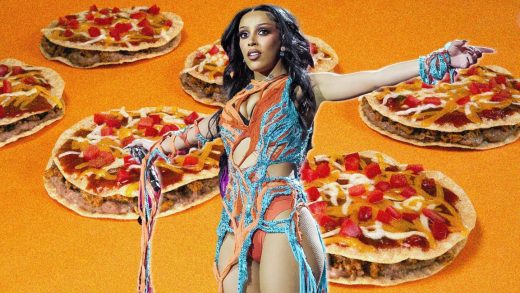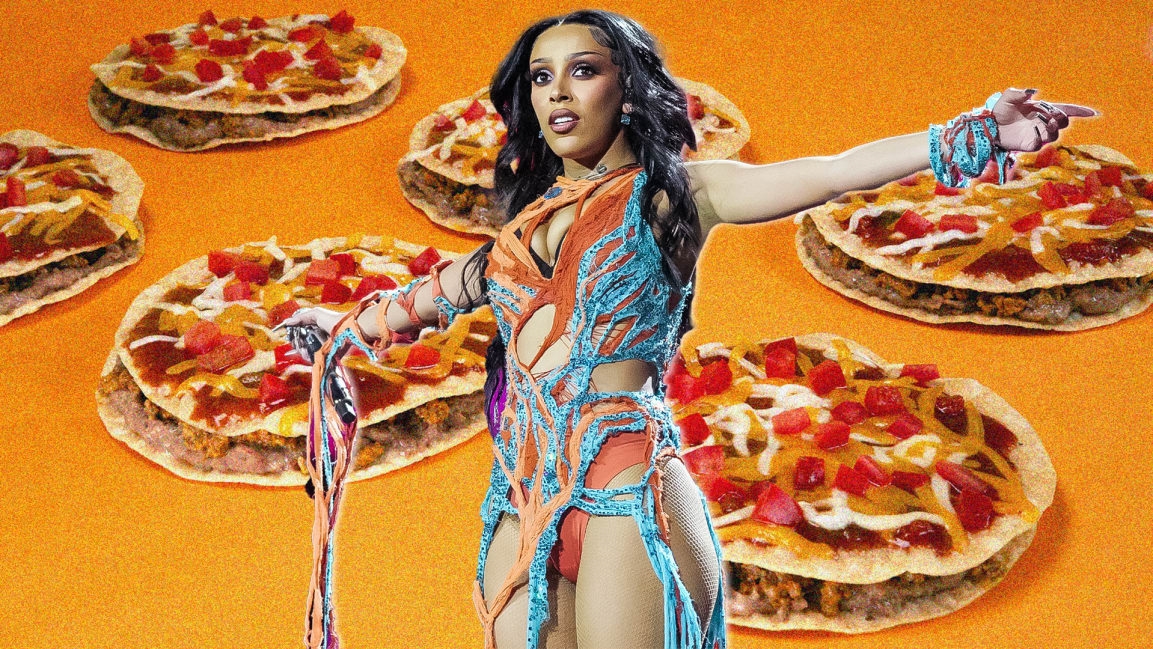Doja Cat, Taco Bell, Mexican pizza, and the making of a marketing unicorn
It was all inevitable. Probably. This week, Taco Bell announced that it was already running out of ingredients for its Mexican pizza, less than two weeks after bringing the once-popular item back to the menu. According to the company, demand is seven times higher than the last time it was on the menu, back in November 2020. It had been cut as part of the brand’s streamlining efforts.
The explosion in demand can be credited to two things: First, this fast-food cultural Franken-snack is, by almost every account, an orgiastic feast for the senses, a gloriously hearty wheel of piquancy topped only by its majestic heft. Second, the brand enjoyed a massive boost for the Mexican pizza’s return thanks to a unique, ongoing partnership with the musical artist Doja Cat. The tl:dr version is that Doja Cat tweeted a demand for Mexican pizza back in 2020; the brand eventually signed her as an official partner and put her in a Super Bowl ad in February. All the while she used her personal platforms like TikTok and the Coachella stage to hype Mexican pizza’s return.
This is not your bog standard celebrity or artist brand partnership. It’s a magical double rainbow of cultural relevance leading to gangbuster sales that every major marketer is reaching for on a daily basis. Hoping, wishing, dreaming it will happen to them despite a cultural news cycle that chews up and spits out most clever ideas with nary a blip of relevancy.
What’s even more remarkable here is that this isn’t something that is easily replicable by any other brand, let alone Taco Bell itself. You might call this a marketer’s unicorn. But despite its singularly serendipitous appearance, success like this is actually a result of significant groundwork—the kind that can make unique opportunities and cultural breakthroughs for brands and marketers happen more often.
Back when Taco Bell dropped Mexican pizza, Doja Cat tweeted as any brand fan might to register her disappointment.
Please @tacobell bring back Mexican pizza and spicy potato soft taco. I’m asking you nicely first.
— vibegina (@DojaCat) September 3, 2020
Her passion for the cause didn’t fade over time, and another tweet followed about a year later. This time, the brand responded.
Doja ?? wants ?? Mexican ?? Pizza ??
— Taco Bell (@tacobell) September 21, 2021
Together with its ad agency, Deutsch LA, Taco Bell not only officially signed up Doja Cat, but it gave the chart-topping artist more creative control than typically found in a celebrity-brand partnership. The result was an intriguing mix of official, capital-A advertising like a big-budget Super Bowl spot, paired with brand-name appearances on the artist’s personal TikTok feed. Bridging the two, she’s also set to make a Taco Bell-themed TikTok musical with the legendary Dolly Parton. Major advertising, rooted in an authentic relationship with a fan, who just happens to be one of the most popular pop stars on the planet.
If that sounds familiar, you may recall McDonald’s ongoing “Famous Orders” campaign, which taps famous fans for their favorite combination from the Golden Arches menu, co-brands it, couples it with limited-edition merchandise, and promptly sells out of all of it. Rinse and repeat. The House of Ronald has so far done it with Travis Scott, J Balvin, BTS, Saweetie, and Mariah Carey, and there is seemingly no end to this very scalable celebrity format. The Taco Bell-Doja Cat co-brand is different in that the work—and how it’s done—is unique to this artist.
Part of the Doja Cat-as-Taco Bell-spokesperson charm has been her complete lack of any formality. The brand leaned into this by scripting her to “leak” its Super Bowl spot early. She confirmed the return of Mexican pizza onstage at Coachella. And in March, she seemingly spoofed an ongoing (and somewhat troubling) music industry trend of female artists posting about being pressured by record labels to deliver big metrics on the platform. Except here, Doja Cat was openly complaining about having to write a “contractual” Taco Bell jingle.
The brand, for its part, rolled with it.
Congratulations @DojaCat on your big win. We mean it, not just because we are contractually obligated to.
— Taco Bell (@tacobell) April 4, 2022
Contrasting the celebrity partner approaches of McDonald’s and Taco Bell, you’d think any marketing exec would pick McD’s every time, simply for its scalability beyond a single big name. There are the copycats to prove this point. But they should also be actively aspiring to be both authentic and consistent in how their brands engage with culture, which provides the lens through which every opportunity is evaluated.
The Doja Cat partnership may be unique, but it’s not the first time that Taco Bell has found a fun way to tap into a celebrity fan. Last August, it signed Lil Nas X—who once worked at one of the brand’s Atlanta-area locations—as its new chief impact officer.
life has come full circle, i officially work at taco bell again. https://t.co/Z0xWBdHIFS
— MONTERO (@LilNasX) August 23, 2021
Sean Tresvant, Taco Bell’s global chief brand officer, tells me that this generation of consumers values transparency and authenticity, and is looking for real communication from brands, so it built its entire campaign around that idea.
“We allowed Doja to be Doja and that had a real impact on creating meaningful and genuine connections with fans at every touchpoint,” Tresvant says. “It’s relinquishing control and trusting the process and the partner. And while that can be hard at times, I think you can see the payoff throughout the Mexican pizza work.”
For some added perspective, I called Observatory CEO Jae Goodman, who has a long career of pairing artists with brands, such as Kacey Musgraves and Chipotle or, more recently, helping to orchestrate Doritos’ upcoming Stranger Things-branded concert with Charli XCX, The Go-Go’s, and more. Goodman says that consistency in brand values and vision allows marketers the ability to take advantage of the serendipity of, say, a major pop star tweeting at it.
“If a brand is authentic and consistently so, and has that lightning-in-a-bottle moment, they know exactly what the lanes are to take advantage of it,” Goodman says. “So it feels less like a one-off, and more like a brand you know and love that is doing something within their brand values that happens to take advantage of something happening in the culture cycle.”
Doritos has long incorporated music and artists in its advertising, whether it was Peter Dinklage and Morgan Freeman getting battle rap tutorials from Busta Rhymes and Missy Elliott, or a Super Bowl showdown between Lil Nas X and Sam Elliott.
“The way Doritos behaves now in things like the Super Bowl, and how it behaved then in culture, it’s completely believable that there was a Doritos Musicfest ’86,” Goodman says, referencing the forthcoming concert event.
As the pop-culture cycle continues to churn, it’s an approach that more brands will have to take to gain the kind of attention and coverage Taco Bell has captured with Doja Cat. A strong brand voice and the confidence and consistency to be comfortable with the discomfort of ceding control to an unpredictable force, even if it’s just “some f**king jingle.”
(146)



